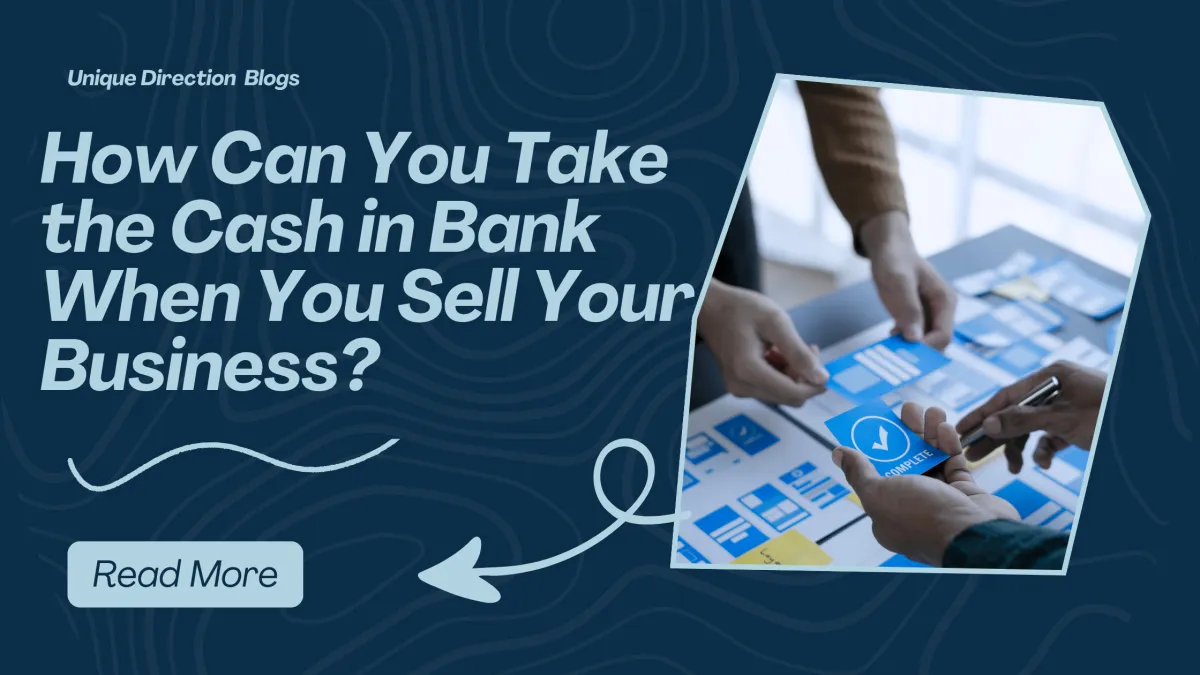
How Can You Take the Cash in Bank When You Sell Your Business?
How Can You Take the Cash in Bank When You Sell Your Business?
Why it’s not as straightforward as you think — and how to do it right.
Introduction
One of the most common — and quietly complex — questions that founders ask as they prepare for exit is:
“Can I take the cash that’s in the business account before I sell?”
It feels like a fair question. You’ve built the business. The bank account’s healthy. And you assume that cash is yours to keep.
But in a business sale, that assumption can cost you — in deal value, in trust with the buyer, and in tax.
This blog will unpack exactly how cash in the bank is treated in a sale, why it matters, and how to plan for it strategically. It’s written for founders who want to exit well — with no surprises.
What Are You Actually Selling?
Not all sales are created equal — and the treatment of cash depends on what kind of sale you’re making.
In most SME transactions in the UK, the buyer is acquiring your company through a share sale. That means they’re buying the limited company itself — and everything in it. The cash, the debts, the liabilities, the assets.
But there are other types of sales too — such as asset sales, where only parts of the business are transferred (e.g. contracts, equipment, IP), and the company itself — and its cash — remains with you.
This matters. Because if a buyer is purchasing your shares, they’re buying the company with the cash in it, unless it’s been explicitly excluded or dealt with prior.
That’s where the idea of “cash-free, debt-free” sales comes in.
The “Cash-Free, Debt-Free” Myth
It’s a term that gets thrown around a lot in deals — but often misunderstood by founders.
A “cash-free, debt-free” deal means that the price the buyer is offering assumes:
The company won’t come with debt on completion
And it won’t come with excess cash either
In other words, the enterprise value of your business is agreed excluding the impact of debt and surplus cash. These are then adjusted at completion to calculate what’s actually paid to you — the equity value.
Here’s a simplified example:
Enterprise value: £2,000,000
Cash in the business: £300,000
Debt: £50,000
Equity value: £2,250,000
In this case, the cash adds to what you get. But here’s the twist — if you extract that £300,000 before completion, the buyer just pays £1,950,000 instead.
You don’t “gain” by taking the cash out — it’s already priced in.
So the real question becomes: how can you extract that cash efficiently, without damaging the deal or your tax position?
The Options You Have — And the Risks They Carry
There’s no one-size-fits-all answer here. It depends on how your company is structured, what the buyer expects, and what the tax implications are.
Here are some common routes founders explore:
1. Taking a Director’s Loan Repayment
If the company owes you money — say you’ve loaned it funds in the past — you can legally repay yourself before the sale. This is not treated as income or dividends, and is generally tax-neutral. But it must be documented clearly in your accounts.
2. Declaring a Dividend
You can declare a dividend and withdraw funds prior to the sale. But this is taxed as income — and if you’re a higher-rate taxpayer, you could be handing over 33.75% or more to HMRC.
3. Adjusting the Deal Value
You could negotiate with the buyer to exclude the cash from the sale and reduce the equity value accordingly. But that requires alignment early in the process — not during due diligence when nerves are high.
4. Leaving It In
If the cash is left in, and the deal is structured cleanly, you may get paid more — and that entire amount could qualify for Business Asset Disposal Relief (10% CGT on the first £1m of gains). But again, only if the structure is planned early and properly.
These decisions are not just financial — they’re also emotional and psychological. A buyer wants a smooth transaction. Springing a change late in the process can erode trust, even if it’s technically allowed.
A Founder’s Misstep — And What It Cost
A founder we worked with had grown his specialist B2B services firm to £1.8M in revenue with £400k cash in the bank. He hadn’t taken dividends for over a year and was planning to extract the cash just before sale.
But he hadn’t told the buyer.
When they reached heads of terms, the buyer assumed the cash would remain in the company — as part of the “clean handover.” When the founder attempted to withdraw the funds during due diligence, the buyer re-valued the deal and reduced the offer by £200k to account for the working capital impact.
Trust was fractured. The deal stalled for two months. And in the end, the founder accepted a lower overall valuation to get the deal done.
The problem wasn’t that he took the cash.
It’s that he hadn’t planned for it — or communicated it — early enough.
What Buyers Are Looking For
Buyers aren’t just paying for your numbers. They’re buying confidence.
When they look at your balance sheet, they’re not just checking the total in the bank — they’re asking:
Is this company well-capitalised to run smoothly post-sale?
Is the seller being upfront about what stays and what goes?
Are there any red flags around tax or extraction that I’ll inherit?
In many cases, a buyer expects you to take the surplus cash — as long as the company retains enough “normalised working capital” to operate. That’s why these conversations need to happen early — during the valuation discussions, not after the offer is made.
How Unique Direction Helps Founders Navigate This
At Unique Direction, this is one of the key areas we address during our BuyerLens Business Audit and Strategic Exit Multiplier phases.
We help you:
Understand what cash the buyer will expect to see on completion
Identify which funds can be cleanly extracted, and when
Coordinate with your accountant to model the most tax-efficient extraction strategy
Align the presentation of your accounts so buyers don’t get nervous at what they see
Our goal isn’t just to help you “get a deal.” It’s to ensure you exit with clarity — and with no surprises on either side of the table.
That means taking a proactive stance on issues like cash, tax, and structure long before the buyer walks through the door.
Planning Ahead = Greater Value (and Less Tax)
Here’s what many founders don’t realise:
Trying to “take the cash” at the last minute might not only reduce the buyer’s trust — it could also cost you far more in tax than necessary.
If you structure your exit carefully, you might find that leaving the cash in — and capturing it through your sale — results in a far lower tax bill, thanks to CGT relief.
But if you try to extract it through dividends, loans, or salary in a rush, you may miss out on those reliefs — or worse, trigger penalties.
Like everything in exit planning, this comes down to timing, transparency, and tax.
Closing Thoughts
Yes — you can take the cash in the bank when you sell your business.
But you can’t take it for granted.
It’s not “your money” in the way most people assume. It belongs to the company — and the way you extract it matters deeply.
The key is not just financial mechanics, but strategic preparation. Knowing when, how, and whether to take the cash is the difference between a clean, high-value exit… and a last-minute scramble that leaves money on the table.
If you’re even thinking about exit in the next 12–36 months, now is the time to get clarity on this — before it shapes your negotiations, your valuation, and your outcome.
Recommendations:
